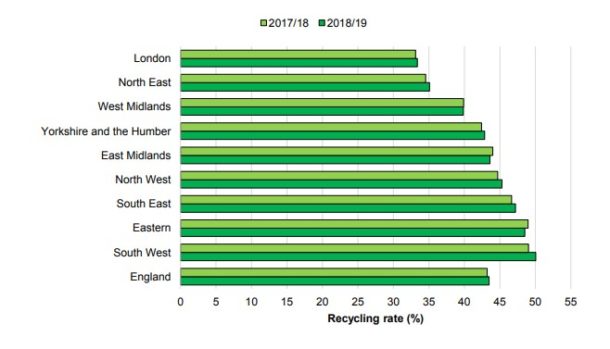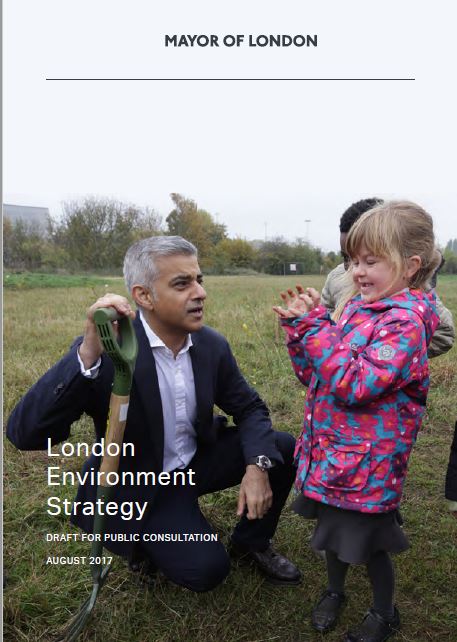All of London’s local authorities have now sent draft ‘Reduction and Recycling Plans’ to the Greater London Authority, amid concerns that London will miss its 50% recycling target by 2025.
The plans set out how individual London’s councils are going to boost recycling rates in their area.
With the latest Defra statistics showing that London only achieved a ‘household’ recycling rate of 33.4% in 2018/19, there have also been calls for increased funding to help with the “significant challenges” that London-based councils face.
The plans were a key requirement under Mayor Sadiq Khan’s 2018 London Environment Strategy and councils were expected to produce one by 2020.
Signed off
However, while the councils have now submitted their plans, as of 19 December 2019, the Mayor revealed he had signed off just three Reduction and Recycling Plans (RRPs) – for Enfield, Tower Hamlets and Richmond.
The Mayor explained that the plans were being reviewed to ensure they are in line with his Strategy and include local recycling targets which are “as ambitious as possible” and that he expected to sign off the remaining plans “by Spring 2020”.
He said: “We are still agreeing local recycling targets with individual boroughs to ensure that they are as ambitious as possible as we review and approve RRPs.”
’55 years’
The development comes as the London Assembly member and Green Party member Caroline Russell suggested last week that if London continues at its current rate of improvement, it would take 55 years to hit the 50% target. She also questioned the “high proportion” of waste which is sent to incineration in the capital.
Ms Russell, said: “Public feeling and concern about waste has never been higher so it’s a shame this just doesn’t seem to be a priority for the Mayor. Recycling saves money and helps cut carbon emissions, so it’s worrying to see how far we’re behind the national rates.”

The latest Defra statistics for 2018/19 showed that London has the lowest household recycling rate of any region in England
Councils’ view
Cllr Julian Bell, chair of the transport and environment committee at the London local authorities organisation London Councils, defended London’s recycling rate and told letsrecycle.com that the capital faces “significant challenges”:
He said: “London boroughs are committed to increasing recycling. We’ve seen a number of innovative schemes introduced in recent years which are supporting Londoners’ recycling efforts and helping shift rates upwards.
“The government needs to bring forward support for councils that will help us meet our ambitious recycling targets”
“However, as a major city with a fast-growing population, London faces several significant challenges. There are all sorts of practical issues in providing recycling sites and transfer arrangements in dense urban areas. For example, the fact that so many London homes are flats – including flats above shops, which make up to 5-10% of housing in some boroughs. Plus, London residents tend to be much more transient than in other parts of the country, which can affect familiarity with local recycling schemes.”
Calling for more government support, Cllr Bell said local authorities in the capital need more funding to hit a 50% recycling rate.
“The government needs to bring forward support for councils that will help us meet our ambitious recycling targets. We’re particularly keen to see the introduction of the Extended Producer Responsibility scheme for packaging, which will ensure producers pay the full net costs of recycling or disposing of their packaging. We anticipate this will provide much-needed revenue for local authorities to invest in our recycling services.”
Figures
Annual local authority recycling figures published in November 2019 show that London achieved a ‘household’ recycling rate of 33.4%, up 0.3 percentage points from 2017/18. This compares to a national household recycling rate of 43.5%.
London also continued to have the lowest household waste recycling rate of any region and, while landfilling less than some other regions, sent the largest proportion of local authority collected waste to incineration in 2018/19, at 59.3% (92.2 million tonnes).
Ten local authorities in London saw their recycling rates decrease during the year, while Croydon achieved a large increase of 9.4 percentage points, achieving 47.3%.
In the statistical release, Defra recognised the complexities of delivering services in wholly urban areas, due to factors such as population density, lack of storage space and low organic waste tonnages.
The post Concern over London’s 50% recycling target appeared first on letsrecycle.com.
Source: letsrecycle.com Waste Managment



